Raising Cain (1992)
Directed by: Brian De Palma
Written by: Brian De Palma
Starring: Frances Sternhagen, John Lithgow, Lolita Davidovich, Steven Bauer
USA
ON DUAL FORMAT BLU-RAY AND DVD: Now, from ARROW VIDEO
RUNNING TIME: 91 min
REVIEWED BY: Dr Lenera, Official HCF Critic
Dr. Carter Nix is a respected child psychologist. His wife, Jenny, becomes concerned that Carter is obsessively studying their daughter, Amy; he regards her like a scientist tracking the development of his creation. But Carter himself suffers from multiple personality disorder consisting of Cain [a street hustler], Josh [a shy 10-year-old boy] and Margo [a middle-aged nanny]. Carter and Cain are killing young mothers to procure their children for his father’s experiments. Jenny bumps into Jack Dante: a man she got close to when she worked as a nurse and the widower of a former patient. She decides to elope with Jack….but Carter accidentally discovers their tryst….
Raising Cain is one film that even the Brian De Palma nuts [and this isn’t meant as an insult – I pretty much consider myself one even if this director does every now and again get it wrong and fall way below his own standard] can’t seem to decide on. Is it an incoherent, absurd self parody in which De Palma all but disappears up his own arse? Or is it one of his most truly clever and stylish works, a great [or often great] filmmaker gleefully having lots of fun in the process. To be honest I can’t really decide myself though it seemed to be a far better movie this time round than when I last saw it which must have been about ten years ago. Quentin Tarantino, a great admirer of De Palma, once said that Raising Cain is unique in that it works to deliberately annoy the viewer and not pay off, and De Palma agreed with him. This is a film in which – for example – its psycho heads towards a girl he’s about to kill with a knife and we think we’re going to get one of those big De Palma murder set pieces – but instead we cut to the girl now dead in the boot of a car. This is a film in which an object is incredibly obviously foreshadowed as an instrument of death – but then doesn’t kill the person at all, instead just missing him. This is a film in which one scene turns out to not just be a dream, but a dream within a dream. While I do agree that it can frustrate [even if you realise that it’s intending to frustrate], I think that Raising Cain is overall one of De Palma’s most audacious works, and one of his purest. For me, it gets substantially better with each repeated viewing.
During production on The Bonfire Of The Vanities, De Palma toyed around with the idea of a suspense movie set in a playground, but was concerned that returning to the genre would be regarded as a step backward in his career. After The Bonfire Of The Vanities was a huge flop and Casualties Of War, despite being a much better film, also did poor business, the director decided to recharge his batteries and return to his comfort zone. Originally called Father’s Day, and initially containing a few more scenes involving Jenny which were then removed to focus more on Carter, the screenplay was written by De Palma himself and specifically for John Lithgow, who had previously done villain duties for the director in Obssession and Blow Out. For the scenes where Lithgow had to talk to one of his ‘identities’, actor Gregg Henry, who also appeared in the film, was the person he acted against. Raising Cain was shot in several California locations on a medium budget. De Palma brought back his old editor Paul Hirsch to replace the original editor as the movie didn’t seem to be working too well. Then a test screening resulted in apparent confusion, so De Palma, perhaps also mindful of the commercial failure of his previous two pictures, re-ordered the first half of the film so that events played in a different order and the film opened with Carter rather than Jenny. It was released to very divisive reviews and only just made its money back. In 2012, filmmaker Peet Gelderblom found a copy of an early version of the script and – using that as a guide – re-edited the film close to what was first intended. De Palma saw it and gave it his blessing, saying “It’s what I originally wanted the movie to be”.
An extreme close-up of part of a TV screen which pans back to show Carter with Amy opens the film, after which we then cut to a playground and Carter with Amy, plus a friend and her child. Carter seems like a really nice guy – so nice that somebody later on ironically says that he’s “the perfect man” – until he begins to talk about his father’s clinic which uses kids as guinea pigs. Then he squirts something in the woman’s eye and chloroforms her. He’s almost discovered in the act, but of course he’s got Cain to keep him focused. Most films would have let us think that Carter’s tough, street wise twin really existed and then given us a big reveal at the end showing that he’s just one of Carter’s personalities, but this one lets us know straight away and we then await anxiously for him to pop up again. As for his father, the film seems to alternate between suggesting that he is real and that he isn’t before settling on an answer – or does it? With the majority of the story taking place from the point of view of a psychopath, it makes sense that Raising Cain soon starts to get odder and seems determined to make it’s not-that-complicated story seem as confusing as possible with the way it often doubles back on itself. It also makes sense that at times we feel sorry for this character[s]. After all, we’re left in no doubt that he’s the way he is because of the abuse he suffered at the hands of his father [yes, it’s all a bit Peeping Tom].
By contrast our callous cheat of a ‘heroine’ isn’t too sympathetic, even for the section of the film which is supposedly from her point of view, though this is probably what De Palma intended so we don’t know who to root for. In one flashback scene she initiates a make-out session with a married man right in front of his bed-ridden wife who’s dying of cancer, upsetting the poor woman so much she instantly kicks the bucket – a scene which, by the way, contains a really unsettling scare moment seen as a reflection on a TV. Then, sometime later, instead of feeling guilty about it, she actively pursues the affair. Many of the scenes between Jenny and Jack are stiffly performed and directed [their first meeting is shot almost entirely in close-ups] like they’re in a TV soap opera, which was no doubt intentional. Elsewhere, there’s lots of showy camerawork in De Palma’s best fashion, perhaps the best example of this being when three characters are shown walking through police headquarters, down two sets of stairs and then taking a lift down to the basement morgue. The director even cheekily has one character several times almost wonder out of the frame to be pulled back in. All this time the same character is delivering loads of exposition in a scene which would normally be very static, as in Psycho where the final few minutes of explanation don’t really work. On another occasion we start to get a love scene but are then confronted with lots of perplexing overlaps. Steven H. Burum does his usual masterly job as cinematographer and makes the most out of the sets, one of which seems to consist almost entirely of sun-lit interiors. Despite all this technical bravura, Raising Cain does threaten to get bogged down a little as it sets things up for the climax [which takes place entirely in slow motion], and it’s disappointing that the director doesn’t much of that wed-wettingly tense suspense stuff that he’s so good at.
Of course the sequence described above is not the only time Psycho is referenced, while there’s even a shot borrowed from Citizen Kane [well, the film’s title does come from a book about Orson Welles’s classic]. Tenebrae and Ghost Story are also referenced in two quite scary moments though De Palma actually executes them better than Dario Argento and John Irvin so I’ll let him off. More than in any of his previous films, De Palma is really most interested in referencing himself. Ideas and images from Sisters and Dressed To Kill in particular recur in a dreamlike, half-remembered fashion. And yet, unlike in much of his earlier work, he holds back on the violence and blood [there’s a slit wrist, a lance going through a stomach, a head butt and that’s about it and not dwelt on either], and almost seems to reveal himself stung by the charges of misogyny that plagued much of his earlier career. Raising Cain is baffling and almost contradictory in so many ways. Some scenes are meticulously staged, but then you have some really sloppy bits like when someone escapes from a police station and the few people there seem to be asleep allowing him to easily walk out. One often gets the feeling that De Palma is just having a laugh [there’s even a bit where Carter is being interviewed by the police and he does an evil grin at the camera when the cops aren’t looking] and bits of this film do come across as a comedy of the darkest kind, but it could also be the director’s most disturbing work [think about it – a father abuses his own son to purposely create a disorder that he’s trying to study, not cure – now that’s disturbing and I’m glad the film only talked about it]. And what’s with all the clocks and timepieces almost shoved in our faces? I can only guess that it’s supposed to show us that time represents stasis, stability and order, acting in opposition to the chaos and disorder of Carter’s mind.
One thing I think everyone is in agreement on is John Lithgow’s full throttle performance, the best of his screen excursions into insanity, from the way he shows little signs of not being quite ‘right’ even when he’s in ‘normal’ mode, to the way he becomes several different personalities during an interrogation scene. He’s actually scariest when playing Carter’s father, projecting so much evil and cruelty. Lolita Davidovich and Steven Bauer just seem bland by comparison, though they’re also almost overshadowed by Gregg Henry as a ‘constantly two steps behind’ cop and Frances Sternhagen as a doctor, and I wish their roles had been bigger. Pino Donaggio, who scored several of De Palma’s 70’s and 80’s efforts, impresses with another extremely sinister but often darkly beautiful score, though it’s less melodic than normal aside from the main ‘love’ theme which is very similar to Michel Legrand’s famous Summer Of ’42 theme in parts, and at times a bit more dissonant too. For the most part, I had a ball with Raising Cain, though it took me four or five viewings over 20-odd years to get to this stage. Some, though, do clearly love it at first sight. Bewildering, dazzling, ridiculous and sometimes just downright insane, it’s probably more of an essential De Palma film than some of his better known work.
Raising Cain comes to Region ‘B’ Blu-ray with a release that is simply terrific in every way, Arrow really going the extra mile for a title which isn’t that well known or popular, but knowing that the fans will appreciate it and the film may get some new admirers along the way. The transfer looks a little soft in places but that seems to have been an artistic decision by the filmmakers. Colours are vibrant and there’s plenty of image depth. The release doesn’t contain an audio commentary, but it doesn’t really need one considering the number of other special features. Arrow have ported over all the interviews from the Region ‘A’ Scream Factory release except for its John Lithgow interview which it substitutes with a new one.
I’ve always liked Lithgow and he’s typically enjoyable to watch and listen to here as he talks of his highly amusing first encounter with De Palma, De Palma’s method, and Raising Cain. The Steven Bauer interview covers similar ground though also talks a bit about De Palma’s Scarface which he was also in. At times he seems unsure of what he’s trying to say but is worth a listen nonetheless. Editor Paul Hirsch then follows with some interesting observations, after which we briefly hear from cast members Gregg Henry, Tom Bower and Mel Harris. What comes across so strongly is how similar De Palma is to Alfred Hitchcock in the way that he seems to prepare everything so meticulously that shooting the actual film is almost a bit of a bore. The interviews finish with a new one added by Arrow with composer Pino Donaggio which is quite lengthy and goes in depth into his early career which I knew little about [he was a pop composer and singer and actually wrote a certain hit song which you will probably know] before moving on to his first scoring experience on Don’t Look Now, and then Raising Cain. The first disc is rounded off with a look at an early script for the film which differs quite a bit from the finished product.
Disc Two contains what is easily the most notable of all the extras in this set – the re-cut version of Raising Cain. The Scream Factory disc was delayed so that this version could be included, and so was the Arrow, which was originally going to be released without it. There’s an introduction to this cut by the guy who did it Peet Gelderblom, who also describes his changes in another featurette, but I decided to go straight into the film, which even has a different opening scene in this version. Instead of beginning with Jack and his kid in the playground, we open with Jenny in a clock shop bumping into Jack, a scene which originally occured 20 or so minutes in. Then we follow Jenny for a while until Carter is suddenly revealed to be a killer and we then rewind chronologically to the playground scene. It’s great to see the film as De Palma originally intended it, and the first half is now better paced and flows better. However, the film now seems even more like Dressed To Kill [not to mention Psycho] than it originally was, and Jenny comes across as being even more dislikeable. So I guess it’s a ‘draw’ as to which version is best, the re-cut not being hugely better in my view, but at least we now have it!
This set comes highly recommended by me; it’s a terrific release of a fascinating film which, even if you hate on first viewing, you may end up eventually loving!
LIMITED EDITION CONTENTS
*Limited Edition [3000 copies] containing two versions of the film on Blu-ray and the theatrical version on DVD
*Optional English subtitles for the deaf and hard-of-hearing on both versions
*Reversible sleeve featuring original and newly commissioned artwork by Nathanael Marsh
*Booklet featuring new writing on the film by Anne Billson
DISCS 1 & 2: THEATRICAL VERSION [BLU-RAY & DVD]
*High Definition digital transfer of the theatrical version
*Hickory Dickory Doc, a brand-new interview with actor John Lithgow
*The Man in My Life, an interview with actor Steven Bauer
*Have You Talked to the Others?, an interview with editor Paul Hirsch
*Three Faces of Henry, an interview with actor Gregg Henry
*The Cat’s in the Bag, an interview with actor Tom Bower
*A Little Too Late for That, an interview with actor Mel Harris
*Raising Pino, a brand-new interview with composer Pino Donaggio
*Father’s Day, a brand-new video essay about the multiple versions of Raising Cain by Chris Dumas, author of Un-American Psycho: Brian De Palma and the Political Invisible
*Theatrical Trailer
DISC 3: DIRECTOR’S CUT [LIMITED EDITION BLU-RAY EXCLUSIVE]
*Raising Cain: The Director’s Cut, a De Palma-endorsed recreation of the film by Peet Belder Gelderblom, re-ordered as originally planned
*Changing Cain: Brian De Palma’s Cult Classic Restored, an introduction by Gelderblom to the Director’s Cut
*Raising Cain Re-Cut, a video essay by Gelderblom on the origins and differences of the Director’s Cut

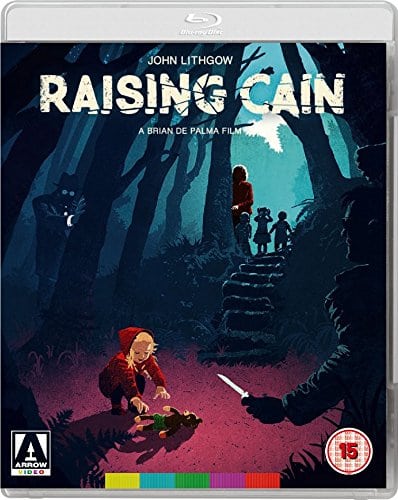
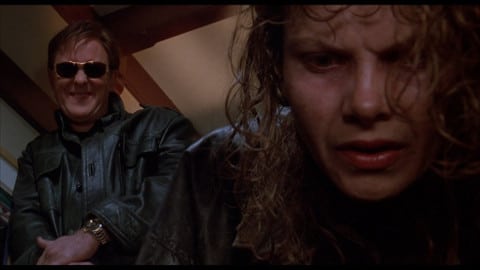
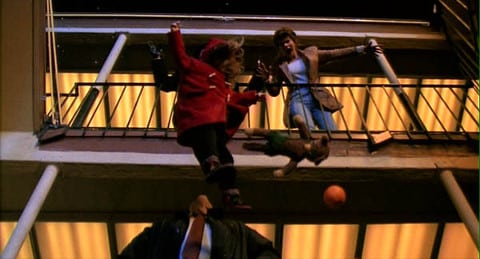




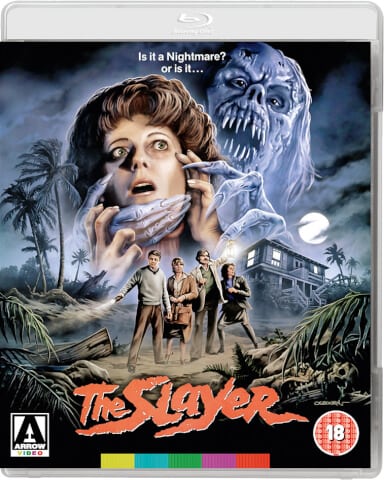

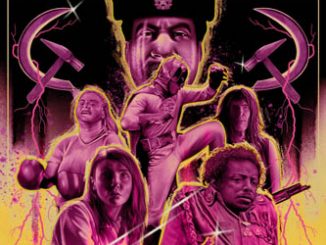
I rather liked this movie on my first watch. Granted, it’s not as stylish as some of his other work but it’s still de Palma. Fantastic review as always, Doc. Spot on.